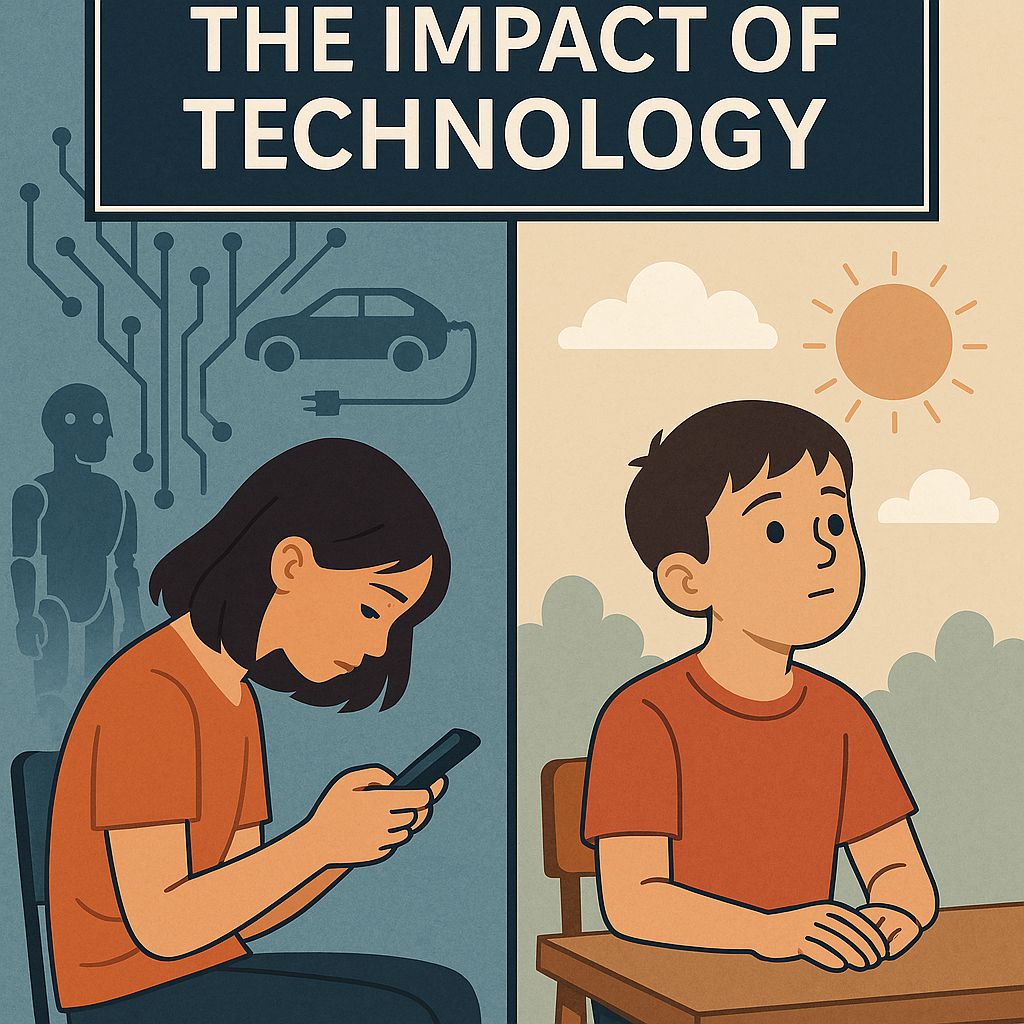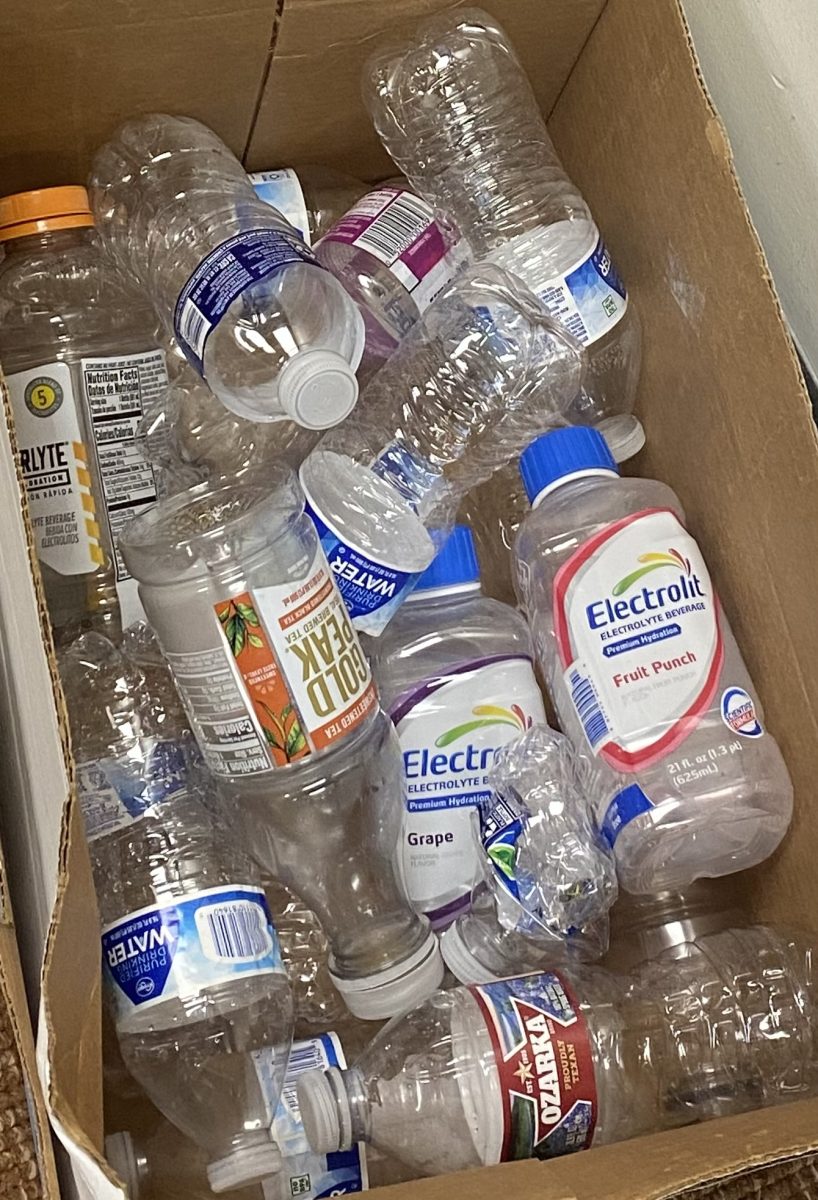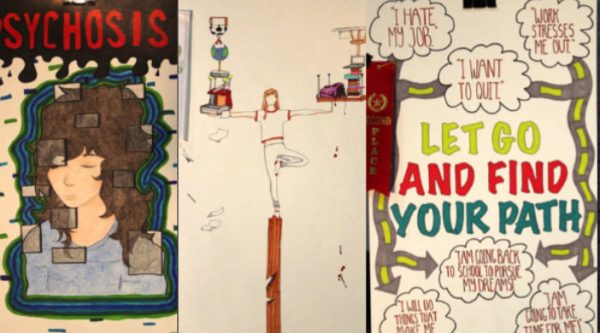Mr. Keith’s junior class competes in an essay contest
In Mr. Keith’s junior English class, all students were required to write an essay over the book they had previously read in class, Fahrenheit 451, by Ray Bradbury. For the essay, the students were given three prompts to choose from, and they are as follows:
-
Perhaps one could argue that reading Fahrenheit 451 is like looking in the mirror. In other words, perhaps Montag’s world and our own world aren’t really all that different. What similarities are there between Montag’s dystopian world and our own
-
Fahrenheit 451 is considered a work of “speculative fiction,” which essentially means “if _____ goes on, then ______ will happen.” Are there any major issues currently going on with our society that could have serious consequences later? If so, choose one issue and determine what the consequences could be if that issue is not resolved. Also, you should try and offer a solution in your concluding paragraph.
-
At the end of Fahrenheit 451, Montag learns that Granger and his followers have all memorized and “become” various important printed works including the bible, Plato’s Republic, The Prince, etc. If you had the choice to become an important printed work, which one would you choose? Your main task will be to argue why that printed work is so important. Focus more on why that work is important to the world and less on why it’s important to you.
When the students chose the prompt they wanted, they were required to get three sources to cite in their essay: one source from the book and two sources from the web. They also learned how to cite their sources and find reliable resources. As soon as the students turned in their essays, Mr. Keith and Mr. Scheideman read through and picked out four of the best written essays out of the class, and those winners received a $10 gift card to Sonic. Those winners included: Akeliah Collins, Alexis Davenport, Camryn Ettleman, and Jocelyn Clawson.
Starting with the first prompt:
Camryn Ettleman
A Censored and Structured World
While reading Ray Bradbury’s novel, Fahrenheit 451, I noticed many similarities between our society, and that of Guy Montag. “I don’t try to describe the future. I try to prevent it.” (Ray Bradbury). Bradbury’s novel presents many consequences to the actions that he was slowly starting to see in the 1950’s, as he was writing this novel. However, the similarities that we see between our world and theirs, prove that this warning may not have been enough. Fahrenheit 451 relates to modern society in many ways including the censorship of media, the broken school system and the general unhappiness of society.
In recent polls, voters in America stated that threats to our democracy are among the highest ranking problems facing the country. Book bans and media censorship were pretty high up on their list of threats. The reasoning behind all of these book bans, according to Elizabeth R. Purdy of Middle Tennessee State University, is that being that “It(use parentheses and clarify what “it” is) portrays white people in a manner that is worse than black people, not that we are equal.” Personally, I believe that the critics are grasping at straws because they don’t like how this book requires people to think about life and reflect on their own actions. This is very similar to Fahrenheit 451, when Beatty says, “[Firemen] were given a new job, as custodians of our peace of mind, the focus of our understandable and rightful dread of being inferior; official censors, judges, and executors.” (Bradbury 47). This means that the government believes that society will be happier if they are not given the option to interpret things on their own because they might feel excluded or as less than from what they read or hear. Similarly, Beatty said “If you don’t want a house built, hide the nails and wood. If you don’t want a man unhappy politically, don’t give him two sides to a question to worry him; give him one. Better yet, give him none.” (Bradbury 61). This means that if you don’t want people making assumptions or conspiracies about what is going on in the world, then you should distract them with other forms of entertainment that will fill their head so they don’t have time or space to think about things. In today’s world, we love to use the media to distract ourselves from what is really going on. Sometimes this is a decision that we make on our own, but sometimes, we are forced to focus on something else because someone is trying to hide something from us. If there is something significant going on in the world that could be controversial, the media floods our brains with useless information from other situations so as to distract us from the real problem. I think they might be afraid of what we found if we had time to think.
In Fahrenheit 451, there is a general unhappiness, or emptiness, that takes over their society. They may at times feel that they are happy, but that is usually from some superficial source and is not true happiness. Overall, Americans in today’s society feel that something is missing from their life. I believe that this is in part, because we miss the little things in life. We are so distracted by the media that we lose sight of the small things that are actually important. This is similar to when Clarisse said, “I sometimes think drivers don’t know what grass is, or flowers, because they never see them slowly,” she said. “If you showed a driver a green blur, Oh yes! he’d say, that’s grass! A pink blur? That’s a rose-garden! White blurs are houses. Brown blurs are cows. My uncle drove slowly on a highway once. He drove forty miles an hour and they jailed him for two days. Isn’t that funny, and sad, too?” (Bradbury, 9). I think we would be amazed by the things that we found if we just took a moment to slow down.
Just like the education system in the dystopian world that Bradbury has created for us, the education system in America is broken and failing. We have teachers that are underpaid, some not even having the qualifications to do the job they were hired for, we have a record number of depressed and suicidal teens, and the priorities of the state are all wrong. The state gives teachers a list of the things that they need to teach their students. The people coming up with these lists have, more than likely, never stepped foot in a classroom. They think they know what needs to be done, but in reality they are ruining the education system. As a student, I can tell you for certain that most of these students don’t remember anything they have learned. We memorize it for the test, do our best to get a good grade, and then flush our brains of all that information to make room for the next section. It’s all about grades, not about what you actually learned and how you retain that information. This causes kids to go out into the real world having no clue what they want to do. Completely clueless and unprepared. Maybe they want us to feel this way. Maybe they want us to be clueless and lost so society can take advantage of us and mold us into the workers and followers that they want us to be. Clarisse seemed to be having some of the same issues with her education, or lack thereof. “But I don’t think it’s social to get a bunch of people together and then not let them talk, do you? An hour of TV class, an hour of basketball or baseball or running, another hour of transcription history or painting pictures, and more sports, but do you know, we never ask questions, or at least most don’t; they just run the answers at you, bing, bing, bing, and us sitting there for four more hours of film-teacher. That’s not social to me at all. It’s a lot of funnels and a lot of water poured down the spout and out the bottom, and them telling us it’s wine when it’s not. They run us so ragged by the end of the day we can’t do anything but go to bed or head for a Fun Park to bully people around, break window panes in the Window Smasher place or wreck cars in the Car Wrecker place with the big steel ball. Or go out in the cars and race on the streets, trying to see how close you can get to lampposts, playing ‘chicken’ and ‘knock hubcaps.” (Bradbury, 27). In Fahrenheit 451, the government wanted workers and followers who wouldn’t question authority figures. They started this process from a very young age through the school system. They thought “If we fill these kids’ minds with all of this useless information that has nothing to do with their future, if we make them sit in the same building for hours on end, unable to talk to the people around them and afraid to ask questions, maybe then they will be too exhausted to question us. Too exhausted to be creative.” Which is exactly what’s happening in our world, and just like the fictional world Clarisse lives in, as long as the government gets what they want, they don’t care how it affects the people under them.
Our modern society is slowly turning into the society we see in Fahrenheit 451 in many ways. Some of these include, books becoming a thing of the past, technology and media taking over, and a failing education system. All of these lead to depression and loneliness in both societies. Bradbury could be trying to tell us that we must take action, or we will end up in a broken society. However, the question, “Will we end up like them?”, is for us to answer.
Alexis Davenport
Fahrenheit 451; A Look in the Mirror
Montag was a simple firefighter who enjoyed his life and his job until he met a girl named Clarisse, who changed his view on the world. In the book Fahrenheit 451, written by Ray Bradbury, Montag’s world is put into comparison to today’s world. The similarities of the two include government power, the overuse of technology, and the underuse of self conscience thought. When looking at his world it is like we are looking right back at our own.
The government likes control, whether it be in a fantasy world like Montag’s or in the world we live in today. Power is what they seek. In the book Fahrenheit 451 the government controls and makes people kinda believe what they want them to believe. For example in the book it says, “And to the government, seeing how advantageous it was to have people reading only about passionate lips and the fist in the stomach, circled the situation with fire-eaters” (Bradbury, 85). They only showed the people what they wanted them to believe was true. Our government in today’s world is kinda similar. Leaving out the bad parts and only spilling the goods to the people so that they believe that what they are doing is right. The mMatter is that the government likes power, and power can be a tricky thing, whether it be something small like what we eat in schools or something big like wars and politics. Fahrenheit 451 brings up good points about how the government can be tricky and powerful, here it says, “ Beaty arranged his cards quietly. “Any man’s insane who thinks he can fool the government and us” (31). Government is controlling and powerful down to the bone making it hard, almost impossible, to get around.
Moving on, technology is one of the biggest problems that society has today. Along with Fahrenheit 451 technology is overused and mistreated. Government also plays a little role in this situation too. It has become a problem far too great for any simple citizen to solve. Technology has many negative effects on society, some of which are portrayed in the book. An article read over negative effects of technology states that, “Social media and mobile devices may lead to psychological and physical issues, such as eyestrain and difficulty focusing on important tasks. They may also contribute to more serious health conditions, such as depression” (Jon Johnson, Medical News Today). Depression is seen throughout Fahrenheit 451 with Montag and his wife Mildred, but in reality of the book the government tells the people that technology is there to make them happy. Bradbury says how technology is the goal to be happy, stating here “Technology, mass exploration, and minority pressure carried the trick, thank God. […] Today, thanks to them, you can stay happy all the time” (55). Many in today’s world believe that technology can make them happy. From little kids to full grown adults technology is overused.
People don’t seem to pay much attention to the world that they are living in. We focus on only the priorities that we have set for ourselves. Some of which may be technology, work, or even other people. The world has everyone doing something at all times; adults are at work, kids are at school and others that stay at home are most likely to be on some type of technology. The world keeps our minds busy and rarely do we notice all of the real problems going on. In this scene of Fahrenheit 451, Montag realizes how little he pays attention to his own life when a girl named Clarrise asks him if he was happy, in which Montag responds in a confused manner. When Montag goes back inside of his home he begins to question himself saying, “ Of Course I’m happy. What does she think? I’m not?” (8). Most people, including Montag and the people of our own world, are so caught up in their own life that they hardly ever take the time to slow down and reflect on everything we have done. “Nearly half of employed Americans (48 percent) consider themselves modern-day “workaholics,” according to new research.” (New York Post, Tyler Schmall). From the quote you just read, it goes to prove that people set their priorities and when they are set most do not look back to see if there is a problem. Most Americans are deeply focused on work, just like Montag was. Our world is distracted. Focused on everything else but the actual world.
In conclusion, our world is much like Montag’s. When it comes to Government power, the overuse of technology, and the underuse of self conscious thought, the book Fahrenheit 451 shares similarities to our world greatly. Looking back on this essay it shows that the world we live in is very corrupt but without the realization of it, there is nothing we can do. Overall the two different worlds put into perspective of each other, will hopefully change people’s point of view of how we go about our lives.
Akeliah Collins
Technology Dependency
Fahrenheit 451 depicts a dystopian society in which firemen continuously start fires instead of taking out fires. If not already aware of what a dystopian society means, a simple explanation comes about as an imagined society in which great suffering or injustice occurs. On the surface, there seems to be a great distance between Montag’s dystopian world in Fahrenheit 451 and our own, however, the way that both societies are exceedingly reliant on technology would bring them onto an equivalent level, in addition to all the repercussions of being so dependent on technology.
Technology has always had a massive impact on our lives, and not always in positive ways. In Montag’s dystopian society, one way that technology has not been helpful is the problems that people seem to have with their memory. “Why didn’t you tell me sooner?” he asked. “I forgot all about it” (Bradbury 45). This works on the topic of memory loss because Mildred didn’t tell the news about Clarisse McClellan to Montag, along with the fact that she had forgotten all about it in just 4 short days. This conversation wasn’t just any news as well, this was over the topic of someone dying, which usually is a pretty big deal, not just forgotten soon. Putting this into a more real-life situation, Kelsey Donehower gives us a more modern example of how technology directly affects our brains and the way that we retain information. “Technology decreases the strength of the memory and how well we will be able to retain that information from our brain” (Donehower). This is proven in simpler words by saying that humans don’t feel the need to remember information, when we have access to all information on many different platforms, on our technological devices. Another example in Fahrenheit 451 of memory issues is when Mildred said, “Funny, how funny, not to remember where or when you met your husband or wife” (Bradbury 40). Mildred, not even knowing how long she had been married, but being able to tell you every single detail about her “family”, says a significant amount about people’s values in their society.
Montag’s dystopian society is heavily reliant on technology, thus leading them to have damaged relationships, as well as not even paying attention to small aspects of their lives, much similar to modern day society. They are so focused on their own lives and block out the rest of the world with their Seashells. As Clarisse said, “Bet I know something else you don’t. There’s dew on the grass in the morning” (Bradbury 7). Montag could not even remember paying attention to this small detail, while Clarisse had paid attention because her family raised her to not be so heavily distracted by technology. Her family raised her to pay attention to small details like the man in the moon, along with the dandelion under the chin to see if you were in love. Montag had been around many years longer than Clarisse and didn’t even know this. When Montag took a step back and looked at his life, he realized that he didn’t know or love his own wife whom he had been married to for ten years. This goes along with what Bjelevac stated, “With more and more people addicted to technology, it causes relationships to be damaged.” In Montag’s society the majority of people barely even had human relationships stemming from the fact that it isn’t even normal for people to go on walks, or even talk to each other. While it is normal for people in our society to go on walks, and talk to each other, it’s more normal to see people focused on a screen, or talking on a phone while out in public or even in our own homes.
Technology is an incredibly distracting tool, and we like to use it as an excuse to avoid many things and situations, including those that are dangerous. with what Aten said, “A room full of people, all sitting at tables with presumably other people they know and have some level of affection for, staring at an illuminated screen.” People are so heavily attached to technology, they can’t even seem to have a proper conversation without being on their phones or getting distracted by some type of technology. Just like in Fahrenheit 451 when Mildren would rather prioritize her “family” over her own husband. Her “family” is just the Tv, except the fact that she watches it so much, more than spending time with her husband, that she calls it her family. “Will you turn the parlor off?” he asked. “That’s my family” (Bradbury 46) Her husband was sick and asked her to turn off the Tv, yet her response is simply choosing the Tv over her sickly husband. People are so constantly distracted by their phones, if you look around in a restaurant there’s likely to be a majority of the people on their phones avoiding their conversations. This is a very common occurrence and is deemed normal in society. People are so attached to their technology that they even depend on it to do basic everyday skills that they shouldn’t need to use technology for, such as setting reminders on how much to eat, drink, or even sleep. “More and more, people tend to depend on technology to the point where it’s dangerously high” (Bjelevac). If you were to go and read from the webpage that Bjelevac wrote, you would get all of the statistics behind what he said. He intensively looked into this topic and found out many different ways of how badly attached to technology we humans are, such as excessive amounts of texting and driving.
Montag’s society can be said as a mirror image of modern society, for the reason of over-reliance on technology, and the repercussions of this dependency. In Fahrenheit 451, Ray Bradbury, depicts a dystopian society as having an immense amount of dependency on technology. Whether that be to just block out the world, or their relationships with other human beings. In modern society, we use these types of methods as well, when dealing with technology. It’s not just blocking out simple aspects of our life, it is also blocking out how well our memory works, problem-solving, and even in cases of texting and driving, we put ourselves at risk of death.
Ending with the third prompt
Jocelyn Clawson
Which Book Would You Choose?
What makes a book worthy? The society in Fahrenheit 451 burns books and other reading materials. They think books corrupt people and the way that they think. At the end of the book a shocking revelation revealed that an organization of people memorize books. They only memorize the books that they think will make an impact on people in the future. Several books out in the world are “worthy” of being remembered, but one of them that most people will not think of is The Dictionary. The Dictionary is an important book that should be memorized because it helps with word definitions, reading comprehension, and communication.
In Fahrenheit 451 the burning of books has happened for quite some time. This has greatly affected how many words people actually know the meaning of. Bradbury points out in Fahrenheit 451 that “”School is shortened, discipline relaxed, philosophies, histories, languages dropped, English and spelling gradually neglected, finally almost completely ignored.” (53). They hardly teach people how to read anymore. Eventually when they do rewrite the books this could prove an issue when they do not understand the reading. Part of the reason that they do not understand the reading is because they do not know what the words in the reading mean. According to Glenn Whitfield of Business Management, Strategy, and related topics “[…] definitions enable us to have a common understanding of a word or subject; they allow us to all be on the same page when discussing or reading about an issue.”. In context this implies that they will never have the ability to agree on or understand the reading without the definitions of words. Another issue they would encounter without The Dictionary would be reading comprehension as well.
Reading comprehension would be bothersome to obtain without The Dictionary. The people in Fahrenheit 451 jump right into the most challenging books to read that they can find. They do not do it on purpose but they do anyways. Bradbury states in the book “Mildred sat across the hall from him. “What does it mean? It doesn’t mean anything! The Captain was right!”” (65). They can no longer comprehend what the books tell them. They do not know how to use context clues or what the majority of the words mean. Bradbury also wrote “Ladies, you won’t understand a word. It goes umpty-tumpty-ump.” (95). This also shows that the characters do not know how to take what they have read and make sense of it. According to Dorothy Brandon of Evolution “Comprehension adds meaning to what is read. Reading comprehension occurs when words on a page are not just mere words but thoughts and ideas.”. They lack comprehension skills so they can not take the words off of a page and know the meaning of that particular sentence. The Dictionary could also help with communication if they know what to do.
The people in Fahrenheit 451’s society have very basic communication skills. For example, Bradbury wrote, “He spoke the words haltingly and with a terrible self-consciousness. He read a dozen pages here and there and came at last to this: […]” (65). They no longer know how to pronounce certain words. Which makes it hard to understand for themselves and for others. It only gets worse from there, so they need a way to figure out how to pronounce a word by themselves. “The wrong pronunciation can cause confusion and misunderstandings. It tends to also convey the wrong messages.” (Engear Education). The Dictionary helps with pronunciation which carries over to communication. When they know what the words sound like, society will have the processing ability to understand people reading out loud.
Even though it is important to memorize as many books as possible, The Dictionary just might be the most important. It helps people understand the definition of words. It helps people comprehend what they are reading. Finally it helps people communicate with each other better. That is why The Dictionary should be one of the books they not only memorize, but prioritize over all of the other books.
Your donation will support the student journalists of Larned High School. Your contribution will allow us to purchase equipment and cover our annual website hosting costs.
























